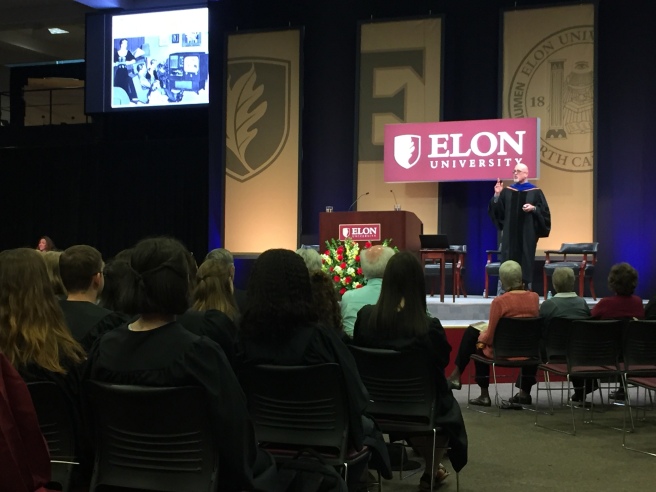 Multimedia reporting by Julia Lescarbeau
Multimedia reporting by Julia Lescarbeau
March 30, 2017 — Harvard psychologist and professor Daniel Gilbert headlined Thursday afternoon as Elon University’s key note speaker for the annual Spring Convocation event.
Gilbert is most recognized for his popular TED Talk, “The Science of Happiness” which remains one of the 15 most-popular videos in the series’ history. His New York Times bestselling book has been widely recognized, awarded and celebrated in the scientific community. Gilbert additionally contributes regularly to several print and broadcast publications as well as appearing on popular radio and talk show programs.
Beliefs about what will make us happy are often wrong – a premise Harvard psychologist Dan Gilbert supports with intriguing research and explains in his brilliant and funny book. Stumbling on Happiness is not a self-help manual, but a deep and delightful explanation of what psychologists, neuroscientists and behavioral economists have discovered about why people are so poor at predicting the sources of their own satisfaction. How to determine what will make “us” happy has dramatic implications for business strategy, sales and marketing, and understanding customers
 Students gathered in the Alumni Memorial Gymnasium and filed into their seats. The
Students gathered in the Alumni Memorial Gymnasium and filed into their seats. The
graduating class of 2017 marched in their academic regalia and president’s and dean’s list students were also recognized.
President Lambert addressed the community, stressing the importance of higher education in the world today. “I ask you to be advocates for the liberal arts and sciences, to be the voice in your community to help others understand the essential role of education, and to prepare yourselves with the fundamental facts about the importance of education,” he said.
Associate Professor India Johnson addressed the audience to introduce Gilbert. Johnson shared that Gilbert served as an inspiration to her in her non-traditional journey in higher education.
Gilbert took the stage, thanking Elon for the warm welcome. “This is the highlight of my year!” he joked, saying it was refreshing to address the crowd as a speaker instead of a professor.
He dove into his presentation on the science of happiness.
“It’s not one of the oldest questions, it’s one of the newest questions,” he said.
Our ancestors, he explained, felt happiness was having everything you needed and everything you wanted. He said that, in simpler times, survival meant happiness. “If you didn’t die, it was a good day,” he said.
He then moved on to discuss what his mother told him he needed to be happy- marraige, money and children. Relying on the scientific data for support, Gilbert broke down each of these possible keys to modern happiness.
“Raise your hand if marriage causes happiness,” he asks.
He comments on the scarcity of hands raised, with absolutely no votes from the student population. To the audience’s surprise, he tells us that – as supported by science – marriage makes people happier.
He added, “Everything that makes people happy, married people have more of it.”
The next point address was money. Does money buy happiness? Gilbert tells us it definitely does.
“Although money does buy happiness the relationship between money and happiness isn’t simple… once we’re making $65,000, we’ve attained 95% of our potential happiness,” he said before joking that number was what Bill Gates would tip a waitress.
What we spend our money on, however, is where people can go wrong in terms of happiness. Gilbert’s data found that people were most happy when they were exercising, talking with others or listening to music. People were least happy when they were at work or resting.
“An occupied mind is a happy mind, an open mind isn’t.”
“People should spend more money on experiences and less on stuff,” he says. “Human beings get great amounts of happiness from their human relationships.”
Gilbert’s mother’s third key to happiness was children. “This seems like an easy one,” he said, comparing it to the controversy of marriage and money leading to happiness.
Using visual data, he found a surprising fact. “People with children are less happy than people without children,” he said. His data found that the birth of a child, more so than divorce or loss of a spouse, made people unhappy.
“People adapt to negative circumstances, but babies don’t go away,” he explained.
He went on to challenge this data. “My perception as a person who has a child is that ‘these data are crazy, they’re obviously wrong’,” he said. “I wanna suggest to you that the way it looks when we are living it than how it looks from a scientist’s point of view are different.”
Gilbert explained that the average person would feel less happy after having a child. A married couple with money, he said however, would be happy bearing children. It’s based on the circumstance.
He says his mother was right with her keys to happiness, but recognizes that they are all circumstantial and often unique to the individual.
“I came here to tell you about happiness because happiness is what matters, it’s what we’re all here for,” he said. “But I want to suggest to you that we look to the wrong places for what we aim to find.”
Gilbert closed to a tremendous applause before taking his seat.
 President Lambert reclaimed the podium to recognize the academic achievement of Elon’s student body and graduating class. The recessional began to play as students and faculty exited the venue.
President Lambert reclaimed the podium to recognize the academic achievement of Elon’s student body and graduating class. The recessional began to play as students and faculty exited the venue.
Elon’s convocation program is a time for campus to gather as a community to recognize academic and philanthropic achievement. The celebration reflects the university’s commitment to excellent and generosity in the spirit of a liberal arts and sciences education. Previous convocation speakers include Neil deGrasse Tyson, Steve Wozniak and Bob Woodward.
